If you are using Windows 10 for a while, you definitely know that the classic Personalization options were removed in one of the pre-release builds. All options to personalize are now there in the Settings app, which is a Metro app designed for touch screen users and has controls which are poorly designed or have limited functionality. If you are not satisfied by this new way to tune up your OS appearance, you might be interested in accessing the classic Control panel applets. Thankfully, it is still possible.
Advertisеment
As of this writing, the latest Windows 10 release is build 1511, also known as Threshold 2 (TH2) or November update. It still contains all working applets like Desktop background, window color, sounds and screen saver. Microsoft just hides them from the classic Control Panel. They can be opened using appropriate commands.
See the older article "Add classic personalization menu in Windows 10 build 10074" for the full command reference.
There are different methods to open classic appearance settings.
- Using the commands mentioned above, you can create shortcuts and put them on the Desktop or in any other folder on your hard drive. The next time you need to customize the appearance, you can just click the appropriate shortcut.
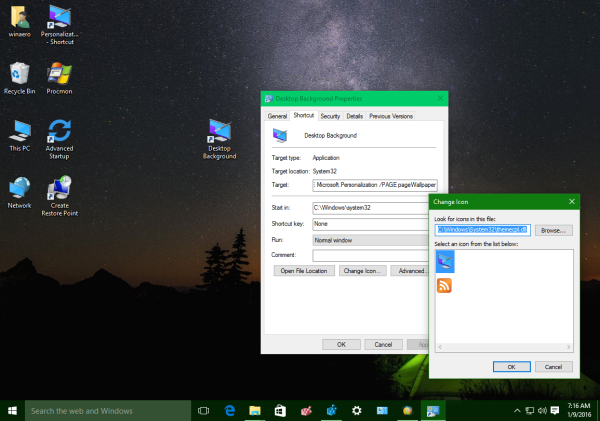
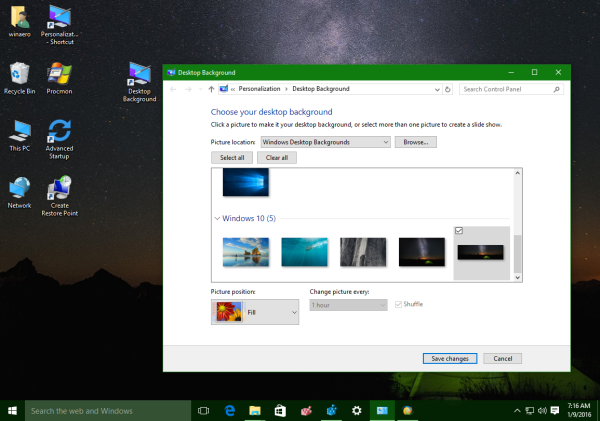
- Create a Desktop context menu which contains the appropriate commands. It will look like this:
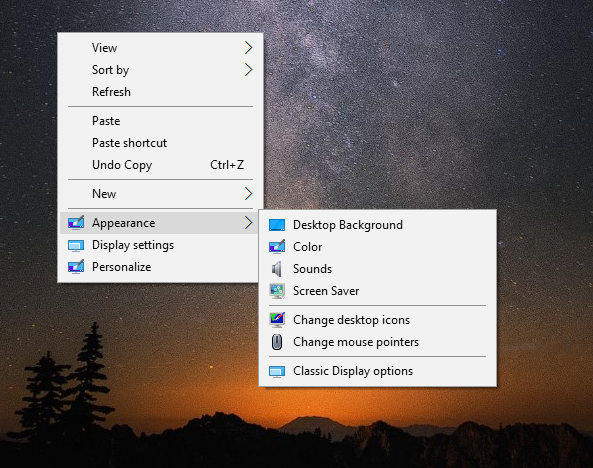
This can be done by a simple Registry tweak. I made ready-to-use Registry files for you, so you can download and double click them to get such a menu.It contains the following commands:
Windows Registry Editor Version 5.00 [HKEY_CLASSES_ROOT\DesktopBackground\Shell\Appearance_WAT] "Icon"="themecpl.dll" "MUIVerb"="Appearance" "Position"="Bottom" "SubCommands"="" [HKEY_CLASSES_ROOT\DesktopBackground\Shell\Appearance_WAT\Shell] [HKEY_CLASSES_ROOT\DesktopBackground\Shell\Appearance_WAT\Shell\01DesktopBackground] "Icon"="imageres.dll,-110" "MUIVerb"="Desktop Background" [HKEY_CLASSES_ROOT\DesktopBackground\Shell\Appearance_WAT\Shell\01DesktopBackground\Command] @="explorer.exe shell:::{ED834ED6-4B5A-4bfe-8F11-A626DCB6A921} -Microsoft.Personalization\pageWallpaper" [HKEY_CLASSES_ROOT\DesktopBackground\Shell\Appearance_WAT\Shell\02Color] "Icon"="themecpl.dll" "MUIVerb"="Color" [HKEY_CLASSES_ROOT\DesktopBackground\Shell\Appearance_WAT\Shell\02Color\Command] @="explorer.exe shell:::{ED834ED6-4B5A-4bfe-8F11-A626DCB6A921} -Microsoft.Personalization\pageColorization" [HKEY_CLASSES_ROOT\DesktopBackground\Shell\Appearance_WAT\Shell\03Sounds] "Icon"="mmsys.cpl" "MUIVerb"="Sounds" [HKEY_CLASSES_ROOT\DesktopBackground\Shell\Appearance_WAT\Shell\03Sounds\Command] @="rundll32.exe shell32.dll,Control_RunDLL mmsys.cpl ,2" [HKEY_CLASSES_ROOT\DesktopBackground\Shell\Appearance_WAT\Shell\04Screen Saver] "Icon"="PhotoScreensaver.scr" "MUIVerb"="Screen Saver" [HKEY_CLASSES_ROOT\DesktopBackground\Shell\Appearance_WAT\Shell\04Screen Saver\Command] @="rundll32.exe shell32.dll,Control_RunDLL desk.cpl,screensaver,@screensaver" [HKEY_CLASSES_ROOT\DesktopBackground\Shell\Appearance_WAT\Shell\05DesktopIcons] "Icon"="desk.cpl" "MUIVerb"="Change desktop icons" "CommandFlags"=dword:00000020 [HKEY_CLASSES_ROOT\DesktopBackground\Shell\Appearance_WAT\Shell\05DesktopIcons\Command] @="rundll32 shell32.dll,Control_RunDLL desk.cpl,,0" [HKEY_CLASSES_ROOT\DesktopBackground\Shell\Appearance_WAT\Shell\06Cursors] "Icon"="main.cpl" "MUIVerb"="Change mouse pointers" [HKEY_CLASSES_ROOT\DesktopBackground\Shell\Appearance_WAT\Shell\06Cursors\Command] @="rundll32.exe shell32.dll,Control_RunDLL main.cpl,,1" [HKEY_CLASSES_ROOT\DesktopBackground\Shell\Appearance_WAT\Shell\07Display] "Icon"="display.dll,-1" "MUIVerb"="Classic Display options" "CommandFlags"=dword:00000020 [HKEY_CLASSES_ROOT\DesktopBackground\Shell\Appearance_WAT\Shell\07Display\Command] @="control.exe desk.cpl,Settings,@Settings"Alternatively, you can use Winaero Tweaker. With one click, you can enable or disable the "Appearance" Desktop context menu.
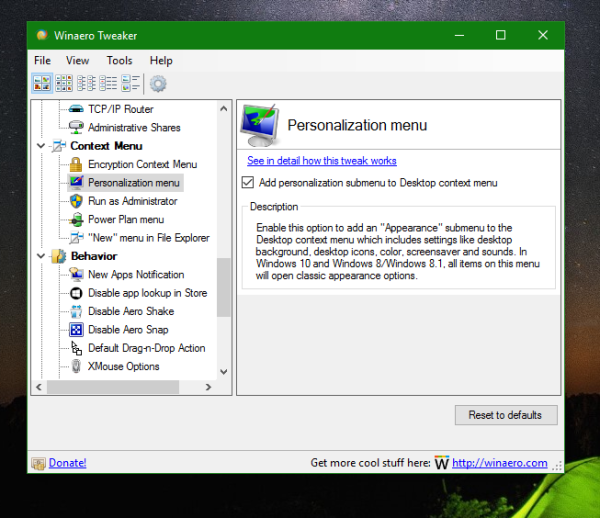
This will save your time and you can avoid manual Registry editing. - Use Personalization Panel for Windows 10. My special freeware app re-invents classic Personalization options with recreated applets which work like the original. The app also supports Desktop context menu integration. Once you start using it, you won't notice much difference compared to the same applets in Windows 7 or Windows 8.
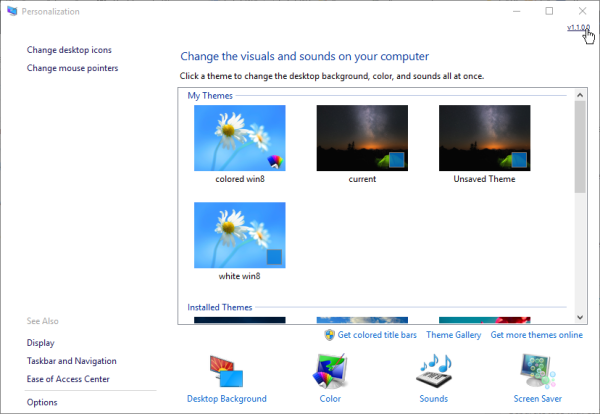
You can decide for yourself which method is most suitable for you. The result will be the same - you will be able to use the classic user interface instead of the Settings app. Please keep in mind that Microsoft continues to eliminate code which belongs to the classic Control Panel. So, some day, the tricks mentioned in this article might stop working. It can happen in some new Windows 10 build or after installing an update to Windows 10.
Which user interface you prefer to personalize the operating system - the new one (Settings app) or the classic UI?
Support us
Winaero greatly relies on your support. You can help the site keep bringing you interesting and useful content and software by using these options:

Is there a feature in WinAero which permits changing the color of the desktop icon labels?
I just have one question, will a Java desktop application run on Windows 10 with this program? Or tweak?
Thank you for your time and attention to this matter
Brad Patterson
This app won’t affect any Java application. It should not, it has nothing common with Java.
thank you have a blessed day!
Sergey,
I have a Java applet that I used on my desktop for a background, Windows 10 will not let me select the file in order for it to become a background. It is an htm file. In order to be able to select the file dialog boxes that are in Windows XP for display seems to be the only thing that is going to work. I know you’re a busy man but if you want to look at the file and see if you can figure out why I can’t customize a Windows 10 desktop as good as XP. What good is the OS if I can’t even make my desktop settings like I had them in XP? I installed FrontPage on Windows 10 and I also installed mjvm, the applet runs fine in the program just won’t run on the desktop. Not quite sure where to go from here. Any insight would be helpful.
Thank you
I even not sure that it is possible in modern Windows versions.
I need to look.
Microsoft has Removed active desktop on Windows 7, 8,&10, how do we get this back?
On build 15042, this method no longer works.
Yep. Just tested in 15046, doesn’t work.
So does that means that Microsoft completely remove the access to these settings on Control Panel? Is so, then I’m predicting that File Explorer and Control Panel will be eliminated on RS3.
This is still possible, for now. If you set the registry Command values to the following for DesktopBackground and Color, respectively, it will still open the old interface.
explorer shell:::{ED834ED6-4B5A-4bfe-8F11-A626DCB6A921} -Microsoft.Personalization\pageWallpaper
explorer shell:::{ED834ED6-4B5A-4bfe-8F11-A626DCB6A921}-Microsoft.Personalization\pageColorization
Registry Locations:
HKEY_CLASSES_ROOT\DesktopBackground\Shell\Appearance_WAT\Shell\01DesktopBackground\Command
HKEY_CLASSES_ROOT\DesktopBackground\Shell\Appearance_WAT\Shell\02Color\Command
Sorry, I forgot to update this article.
Commands were covered here:
https://winaero.com/blog/classic-window-color-windows-10-creators-update/
I will do right now.
I have build 1703 and this does not work in that build. Any chance for an updated version so it will work?
It was updated to be compatibly with 1703.
Can you tell me which commands fail for you?
In Windows 10 Pro Build 1709…not work :-(
What exactly?
Mi scuso se provo a spiegarmi in italiano, ma il mio inglese non è molto buono!
Dunque attivando “Add Personalization” da Winaero non si aggiungono più nuove voci al menù del desktop, come invece accadeva prima.
Invece aggiungendo manualmente la modifica al registro, nel menù contestuale finalmente compare la voce “Appearance”.
Ma cliccando su Desktop Brackground e Color non si apre nessuna finestra!
Mentre le voci Sounds, Screensaver, Change icons and Change mouse, funzionano normalmente.
Ah, I see.
Could you tell please which Windows 10 version/build you are running?
I will try to reproduce this issue here.
—
Ah, capisco.
Potresti dire per favore quale versione / build di Windows 10 stai usando?
Proverò a riprodurre questo problema qui.
Versione 1709 (build SO 16299.371)
OK, I will start my VM right now.
It would be nice to have an additional option for the context menu tweaks to only appear after Shift+RMB.
Hello, does the Personalization Panel for Windows 10 work for Windows 11? If not (I don’t think so), can you make it work for Windows 11 too? Thanks so much.